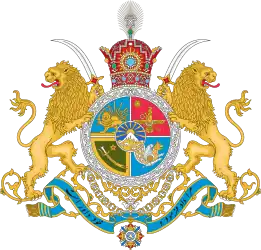| Patrick Ali Pahlavi | |
|---|---|
 Pahlavi in 2010 | |
| Born | 1 September 1947 Paris, France |
| Spouse | Sonja Lauman |
| Issue | Davoud Pahlavi Houd Pahlavi Mohammad Younes Pahlavi |
| Dynasty | Pahlavi |
| Father | Ali Reza Pahlavi |
| Mother | Christiane Cholewski |
 |
|
|
Patrick Ali Pahlavi (Persian: پاتریک علی پهلوی; born 1 September 1947) is a member of the deposed Pahlavi dynasty of Iran and was heir presumptive from 1954 to 1960.[1] According to the former constitution of Iran Patrick was the first in the line of succession to the throne. In 1960, however, with the birth of Reza Pahlavi, the latter became the heir apparent. If the Iranian monarchy were to be restored, he would become the heir presumptive to the throne.[2]
Early life
Born in Paris, Patrick Ali Pahlavi is a son of Prince Ali Reza Pahlavi and his wife Christiane Cholewski (or Choleski), a French woman,[1] of Polish descent (although no record of his parents' 20 November 1946 wedding in the 16th arrondissement of Paris, France, is on official record there).[3] His father chose for him an Irish name popular in France, 'Patrick', and his mother chose for him a Muslim name, 'Ali', which made 'Patrick Ali' his full given name.[4] On his birth he was baptized.[5] Christiane had a son from a previous marriage, "Joachim Christian Philippe Pahlavi", born 15 September 1941.[3]
As his father was the second son of Reza Shah, founder of the Pahlavi dynasty and Shah of Iran, Patrick Ali is a nephew of Mohammad Reza Pahlavi, the last Shah.[3] His father was the heir presumptive to his sonless brother's throne and following his death in a plane crash in 1954, Patrick Pahlavi succeeded him as heir presumptive.
In February 1955, Prince Patrick Ali was at the centre of a dispute between his mother and his uncle, Mohammad Reza Pahlavi the Shah. As heir to the throne, his uncle wanted him enrolled at the Maria Jose School in Switzerland to receive a "proper court education" while his mother wanted to take him to Paris so he would be closer to her.[6] Because of the dispute, he was placed in "protective custody" with policemen guarding his suite at the Hotel Excelsior in Italy until his mother gave into the Shah's demands and he was enrolled at the school.[7] In March, Pahlavi's mother took him from his school without the Iranian embassy or the Swiss authorities knowing.[6]
In 1960, with the birth of a son for his uncle, Pahlavi lost his place as first in the line of succession to the Iranian throne.[3]
When he returned to Iran in the beginning of the 1970s, he spoke out publicly about the corruption of the regime of his uncle the Shah. In 1975, he was arrested and jailed at Evin prison, where he faced daily interrogations and psychological torture, including a fake execution.[5]
Exile
Following the Iranian revolution and overthrow of the Shah in early 1979, Pahlavi was the only prince to remain in Iran. He writes, "There, the Clergy was divided about me. There was those who saw in me the danger of a return to the Pahlavi and those who saw in me a possible solution. Four times I was brought to Evin prison again and four times my partisans released me." He left for exile three days before he was due to go on trial where he might have faced a death sentence.[5]
Pahlavi studied and practiced a number of religions and spiritualities, including Taoism, Buddhism (Zen), Hinduism (Advaita), Judaism, Christianity and Islam over a forty-year period.[5]
Pahlavi was married in 1972 to Sonja Lauman; together they have three sons:[3][8]
- Prince Davoud Pahlavi (born 7 July 1972), married Lucilia Da Fonseca in the year of 1998, they have two daughters
- Princess Solvène Pahlavi
- Princess Elsa Pahlavi
- Prince Houd Pahlavi (born 26 November 1973), has one son
- Prince Rafaël Pahlavi (born 2006)
- Prince Mohammad Pahlavi (born 19 May 1976)
References
- 1 2 Ali Pahlavi. About, Biography Facebook
- ↑ "Iran Reacts to Suicide of the Shah's Son". TIME. 5 January 2011. Retrieved 22 May 2019.
Pahlavi's older brother Reza, first in line to the throne, carried the family mantle from a base in suburban Washington, D.C.
- 1 2 3 4 5 Montgomery-Massingberd, Hugh (1980). Burke’s Royal Families of the World: Volume II Africa & the Middle East. p. 149. ISBN 0-85011-029-7.
- ↑ Sorbi with people, MardomTV (Persian) on YouTube. 21 November 2012
- 1 2 3 4 Patrick Ali Pahlavi. "Patrick Pahlavi". Writers.net.
- 1 2 "Iranian Prince Absent". The New York Times. 22 March 1955. p. 2.
- ↑ "Mother Drops Fight Over Iranian Prince". The New York Times. 19 February 1955. p. 3.
- ↑ Predecessors and short history Archived 9 July 2017 at the Wayback Machine members.iinet.net